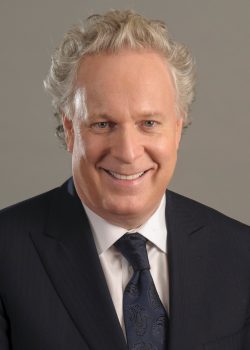A Day for the History Books
Guest Column / Jean Charest

Whenever I’m asked about the 1995 referendum campaign and the extraordinary Place du Canada rally in Montreal just three days before the vote, I almost always start by remembering the feeling of tension and anxiety as the images come back to mind.
The morning of October 27 was grey, cold and windy. My wife Michèle and I were driven from our hotel to Place Ville Marie to join up with the head of the NO camp, Quebec Liberal Leader Daniel Johnson, and Prime Minister Jean Chrétien.
It was silent. Michèle turned to me and said “J’ai froid,” and a few seconds later, she took my hand and said “Je suis inquiète.”
The three leaders had only been together a few times.. This would be our last meeting before the vote on October 30.
The first part of the referendum campaign had been almost uneventful. The NO side was leading. It was all too good to be true.
At mid-campaign, on Thanksgiving weekend, the leader of the YES camp, Premier Jacques Parizeau made a stunning move. He stepped aside and he let his rival, the charismatic Lucien Bouchard, leader of the Bloc Québécois, take over. The effect was immediate and for the federalist side it was devastating.
Bouchard, who had torpedoed his long friendship with Brian Mulroney to embrace Quebec sovereignty, would, at every rally, convey political passion and a sense of mission.
At the midpoint of the campaign, the NO camp had all the charm of a company auditor loaded with statistics.
Our mission was to pull Quebec away from the edge and survive this referendum. The fate of Quebec and Canada hung in the balance.
On the previous Monday, all three of us had attended a very intense rally at the Verdun arena. I had never seen or experienced anything like it. The emotion and intensity of the crowded arena was such that when Michèle and I entered the building, our feet never touched the ground until we reached the stage. During that week, the markets had taken a hit. The dollar had weakened and business had come to a halt. These events set the context of our speeches at Place du Canada.
We made our way to the stage with relative ease. It felt to me like three gladiators heading into the ring. If we lost this fight, there would be no going back. The judgment of history would be brutal and unforgiving.
Once on stage, we could finally get a better sense of how big a crowd and how important this moment would be. The outpouring of emotion from tens of thousands of people was unlike anything any of us had ever experienced.
I remember asking the crowd whether they believed the YES campaign and whether they were ready to risk all they had with Canada to enter the black hole of separation.
Chrétien, as prime minister, committed himself to changing Canada. Daniel Johnson, as leader of the NO campaign, spoke about how Quebecers could feel proud to be Canadians. They were both eloquent and convincing.
The size of the crowd became a hotly debated issue in the media. The separatists said there were “only” 30,000 people. The organizers announced 120,000 people. As usual, the truth would lie somewhere in between.
When the event came to an end, the crowd sang “O Canada” and then lingered. They had experienced something they knew would only happen once in their lifetime. Many of them took to the streets of Montreal to campaign, convince and plead with the Quebecers they met to stay in Canada.
We all thought this referendum campaign would end with the vote to be held three days later. On voting day, 94 percent of eligible voters showed up to express their choice. The NO side won by the slimmest of margins, 50.6 to 49.4 percent.
Canada would go on to fight another day.
But the 1995 referendum left a legacy of broken friendships and divided families, which most Quebecers never wanted to live through again. In my first election as Quebec Liberal Leader in 1998, one of our campaign themes was “No Referendum’. And during our years in government from 2003-12, a referendum was precluded simply by our winning three elections in a row.
A quarter century later, October 27, 1995, remains a defining moment in the modern history of Quebec and Canada.
Jean Charest, a partner at the Law
Firm of McCarthy,Tétrault and three-term Premier of Quebec from 2003-12, was leader of the Progressive Conservative Party and a keynote speaker at the historic No rally in Montreal, October 27,1995.
